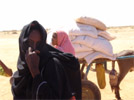
Reports from Somalia today indicate that the compound for the World Food Program was attacked, resulting in the evacuation of staff to Nairobi.
According to media reports quoting WFP spokesman Peter Smerdon, 10 armed men believed to be affiliated with the extremist group al-Shabaab attacked the compound late on Sunday, opening fire on the compound’s guards when they refused to open the gates.
“In the ensuing gunbattle, which lasted about 15 minutes, three of the gunmen were killed and one was wounded. One guard was slightly wounded, the attackers then retreated," Smerdon said, according to AFP. He noted that while the motive is unclear, the gunmen may have planned to kidnap the U.N. workers. Nine members of the international staff were flown to Nairobi early today.
Aid workers have long been the target for violence in Somalia, where militant factions often rally around a message that Somalia needs to defend itself from outsiders. Hostile groups also often target aid workers and journalists due to their potential worth as hostages.
UNICEF reported last week that due to increased hostility toward aid agencies it would suspend delivery of hundreds tons of nutritional supplies intended for 85,000 children suffering from malnutrition in central Somalia. "We need concrete assurances from local authorities for the safe delivery and storage of supplies to ensure that we can carry out programmes for the survival of Somali children and women. We hope these assurances will be forthcoming very soon so that we can continue our operations at a level that matches the needs of children and women and prevent the deaths that will otherwise certainly occur."
As the fighting in Somalia continues unabated, leaving an estimated 1.3 million people displaced within the country’s borders and even more dependent on aid to fulfill basic needs, these incidents – and the measures aid agencies are forced to take – are certainly a distressing trend. What’s clear is that Somalia is in desperate need of a functioning government that can provide these assurances to protect humanitarian space. The question for U.S. policy makers then to consider: How does sending more weapons to the country help achieve this goal?

